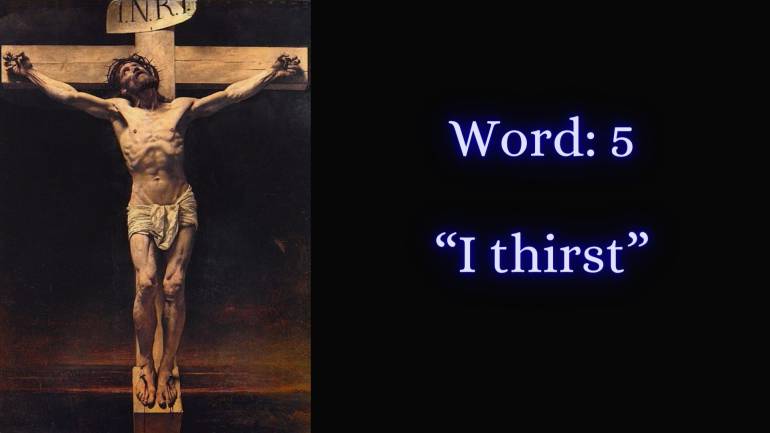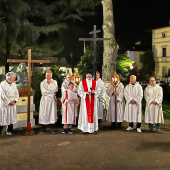The SEVEN Last Words of Jesus. Word:5 - “I thirst”

A. Text: John 19, 28–29
“After this, aware that everything was now finished, so that the scripture might be fulfilled, Jesus said, “I thirst.” There was a vessel filled with common wine. A vessel was lying (there) full of sour wine; so putting a sponge full of the sour wine on hyssop, they held (it) to His mouth.”
B. Exegesis
1. “After this, aware that everything was now finished …”
The mother is commissioned. With that, Jesus has already finished the work He came to do.
2. “in order that the scripture might be fulfilled”
Jesus is now aware that everything is finished. He wants to fulfil the Scriptures. Hence He utters “I thirst.” So He is given wine – a gesture of kindness!
In Psalms 22,16 and 69,22 the just sufferers too cry out, ‘I thirst’ in different words: “My throat is dried up like baked clay, my tongue cleaves to my jaws; to the dust of death you have brought me down” (22,16); “Rather they put gall in my food, and in my thirst they gave me vinegar to drink” (69,22).
Though the Psalmists suffer so much, their confidence in God is not shaken at all. So it is in the case of Jesus, up on a cross. He is uncompromisingly faithful to the end.
Even from the cross, on His deathbed, Jesus seeks to fulfil the Scriptures. Thus what we see on the cross is not a Jesus, who is victimized by the situation, but a Jesus who is triumphant wielding authority and sovereignty. He has sovereign control of His own destiny.
3. “on hyssop”
Mark (15,36) and Matthew (27,48) mention a reed as the instrument for elevating the sponge to Jesus’ mouth. It is more appropriate. In John, wine is offered on a sprig of hyssop. John mentions quite strangely a ‘hyssop’ – a small fern-like plant – and hence, it is scarcely suitable for carrying a sponge.
Why is then this bizarre reference to hyssop? It is a symbolic reference to the hyssop that was used to daub the blood of the paschal lamb on the doorposts of the Hebrews as a sign of God’s protection in the Jewish Passover reenactment of the Exodus, “Take a bunch of hyssop and dip in the blood that is in the basin and put some of the blood that is in the basin on the top-post and on the two (sides) of the doorposts …” (Exodus 12,22). Being a plant with many woody branchlets it serves conveniently as a sprinkler but not as an instrument to elevate the sponge to Jesus’ mouth.
C. Application:
4. It is by the blood of the Paschal Lamb hung on the Cross that man’s innate thirst for liberation – the exodus from death to life, sin to grace, slavery to freedom – is quenched. Recall the Paschal Lamb, a dominant theme of John.
Radio Veritas Asia (RVA), a media platform of the Catholic Church, aims to share Christ. RVA started in 1969 as a continental Catholic radio station to serve Asian countries in their respective local language, thus earning the tag “the Voice of Asian Christianity.” Responding to the emerging context, RVA embraced media platforms to connect with the global Asian audience via its 21 language websites and various social media platforms.














